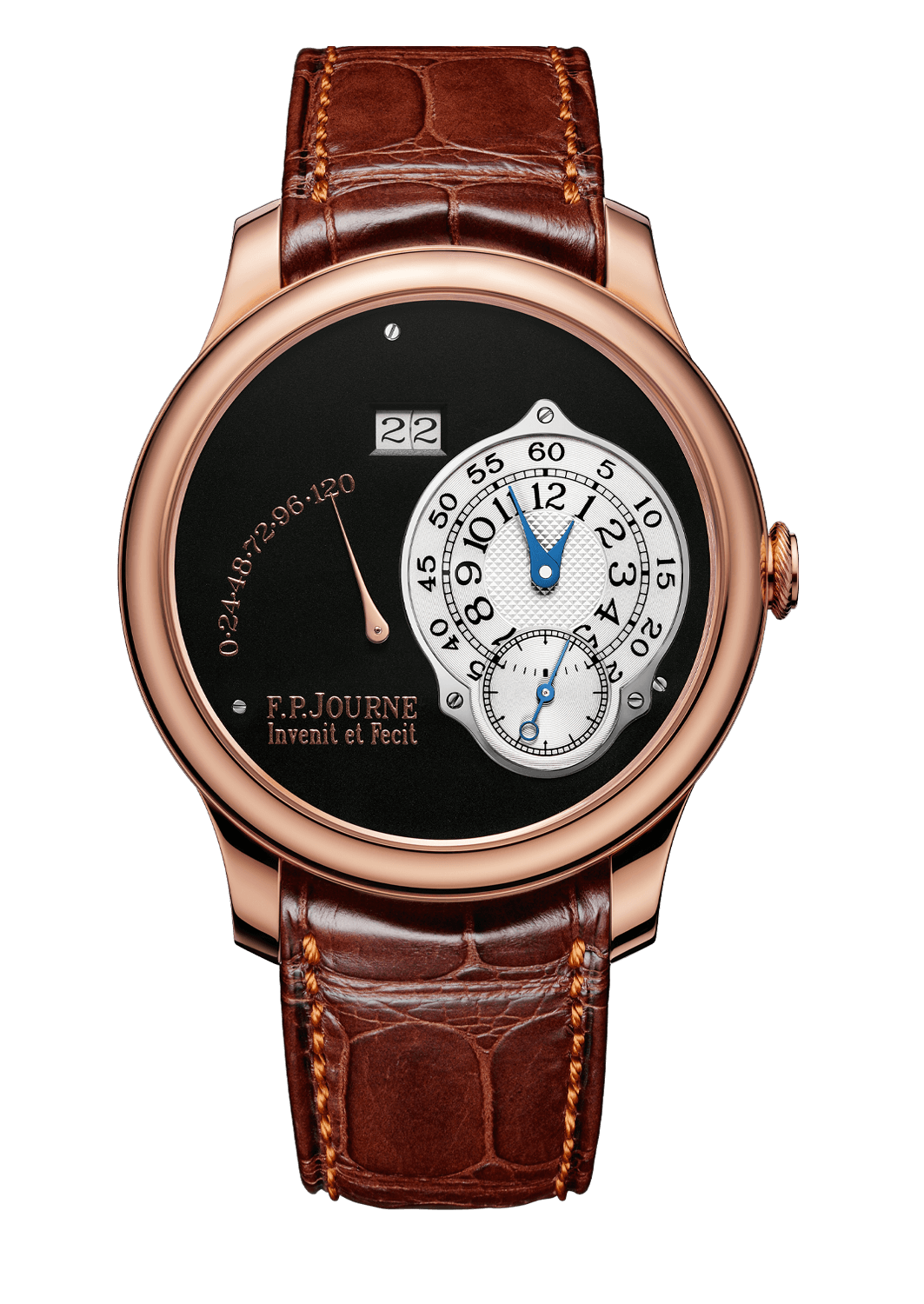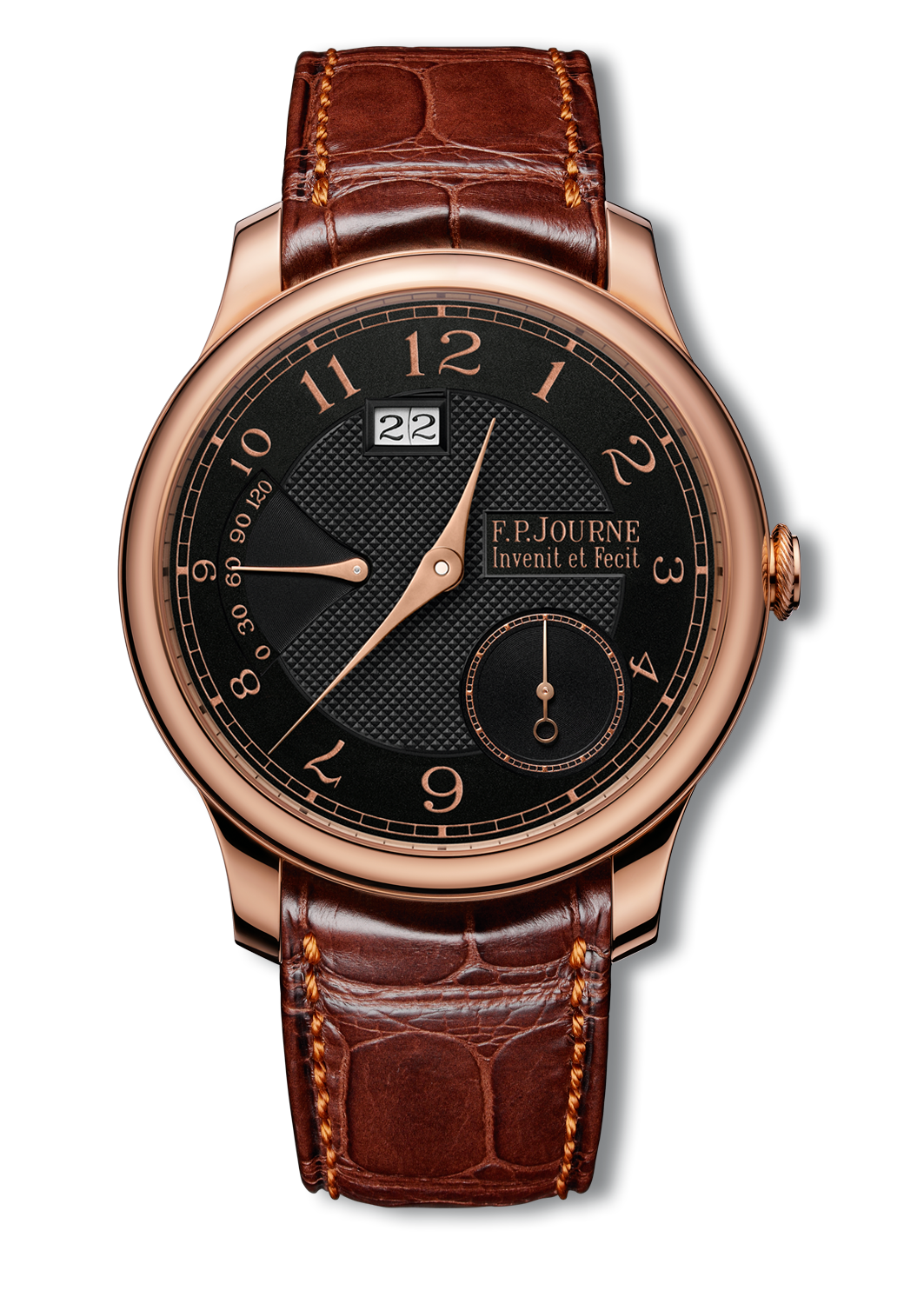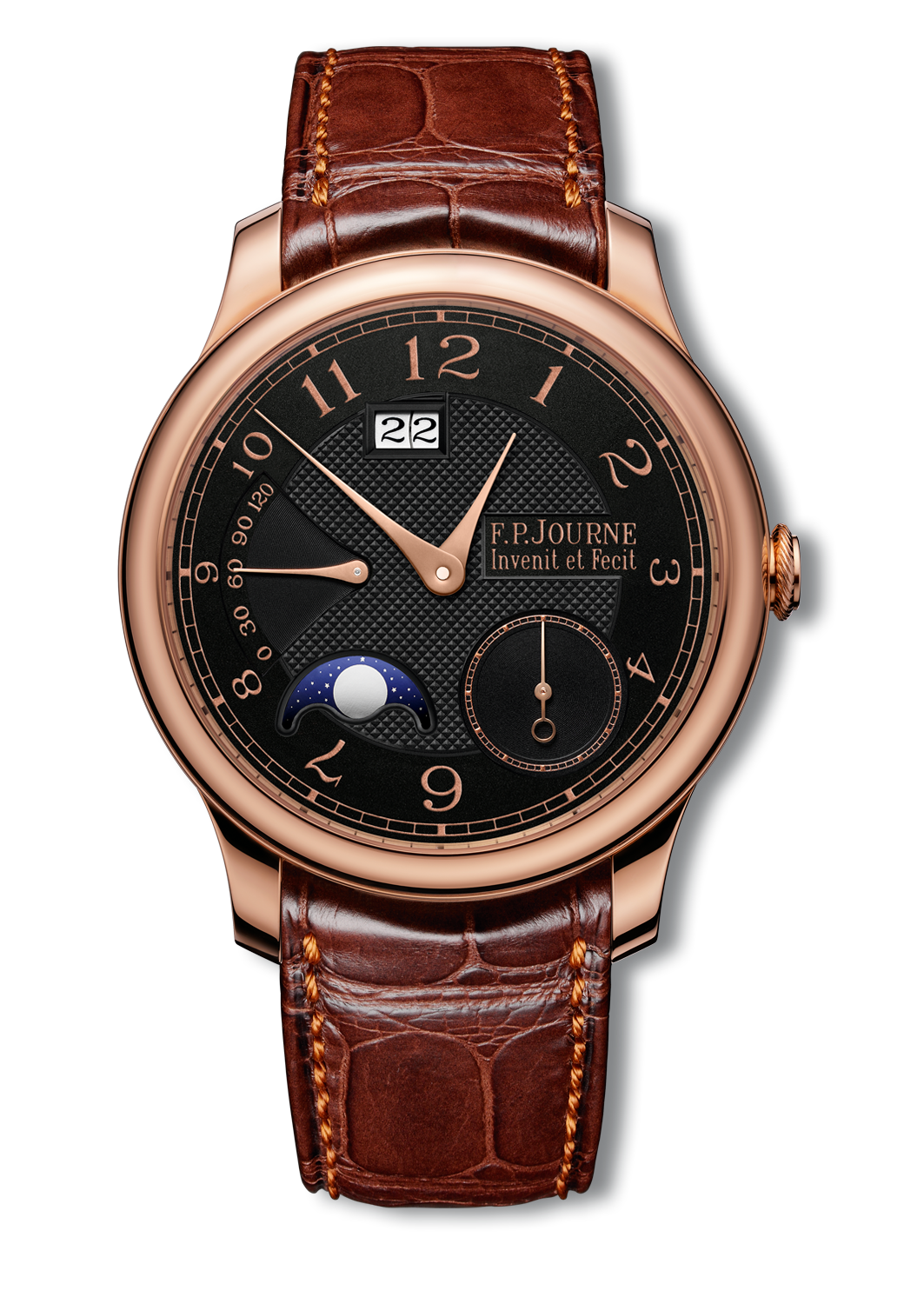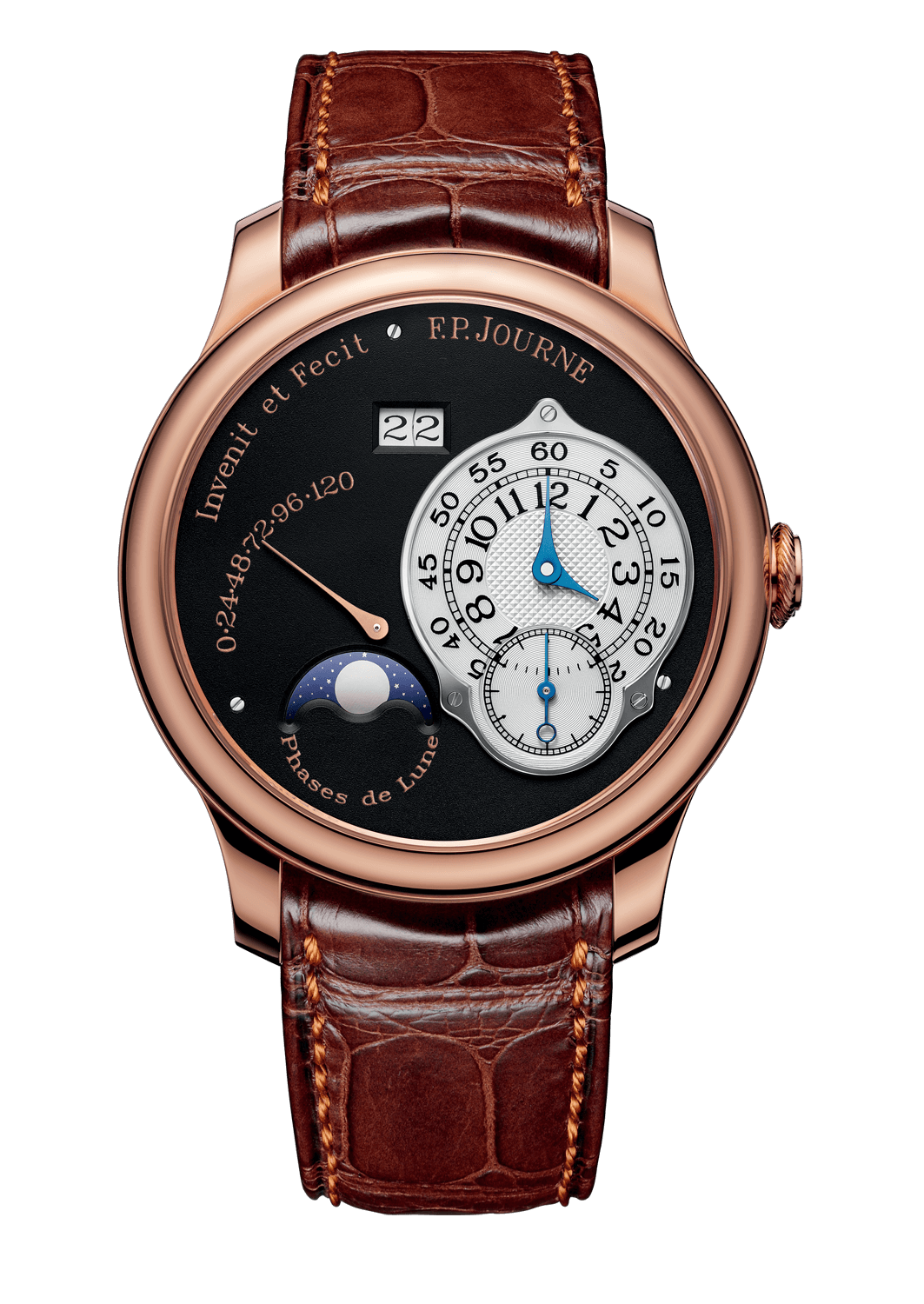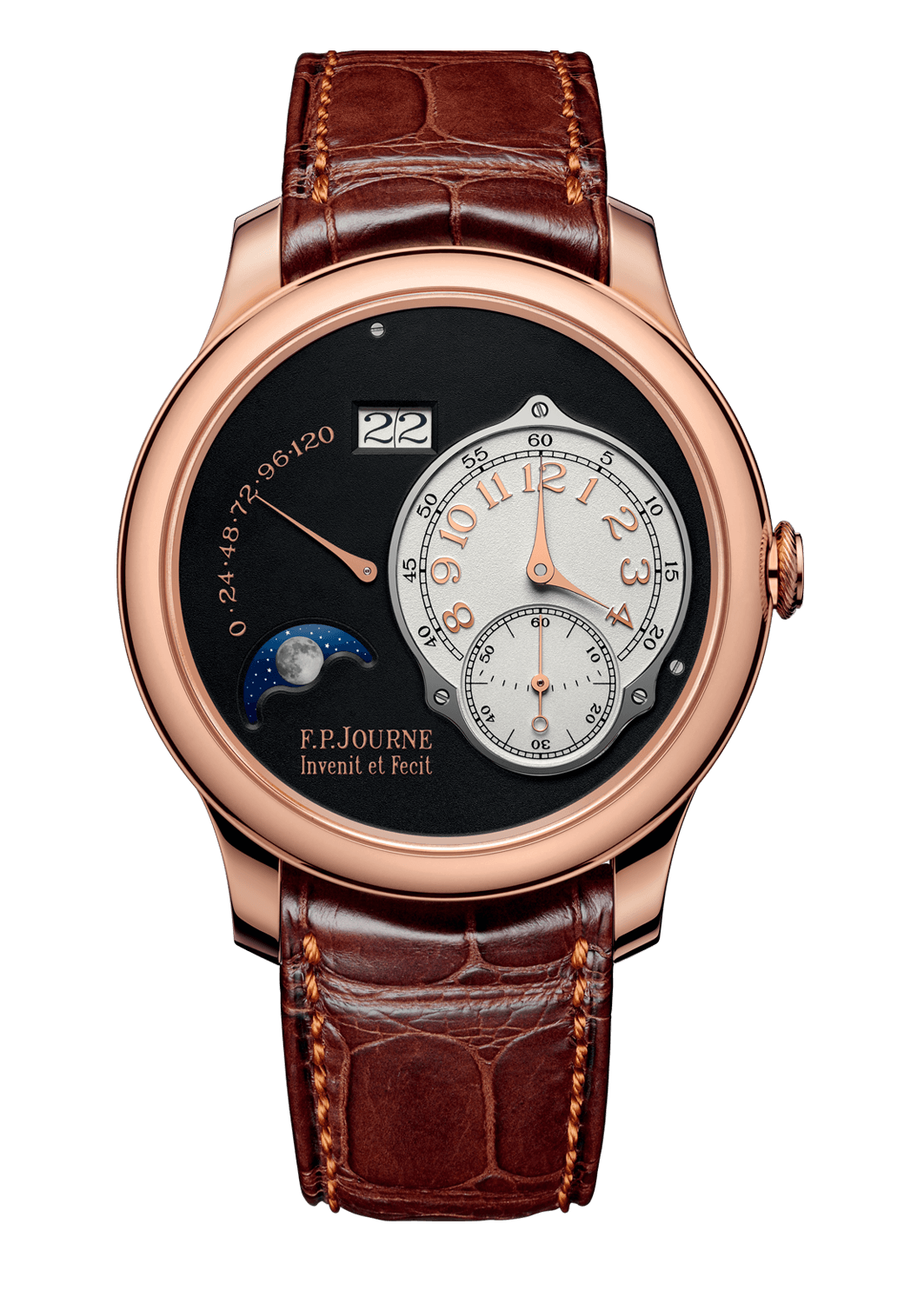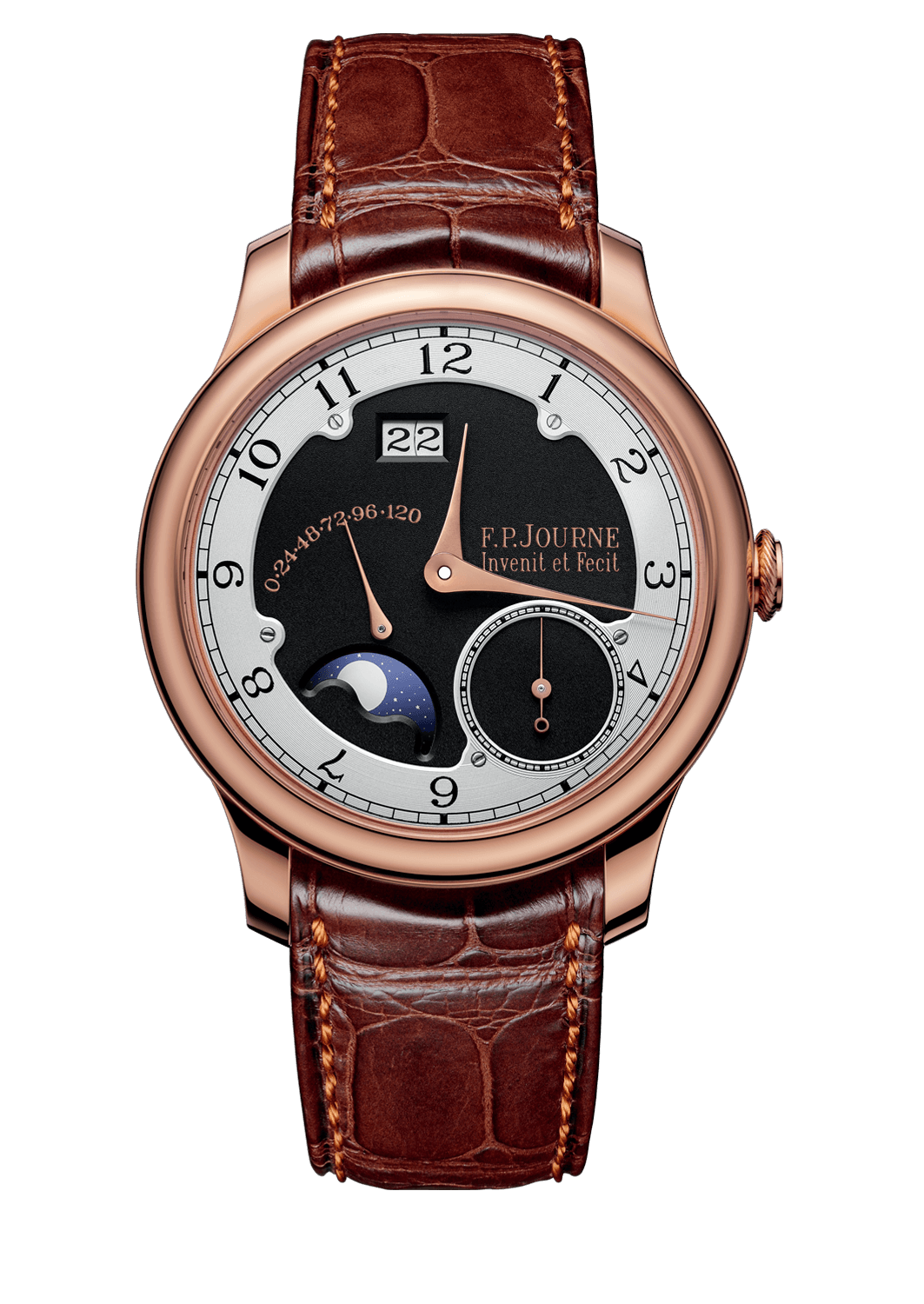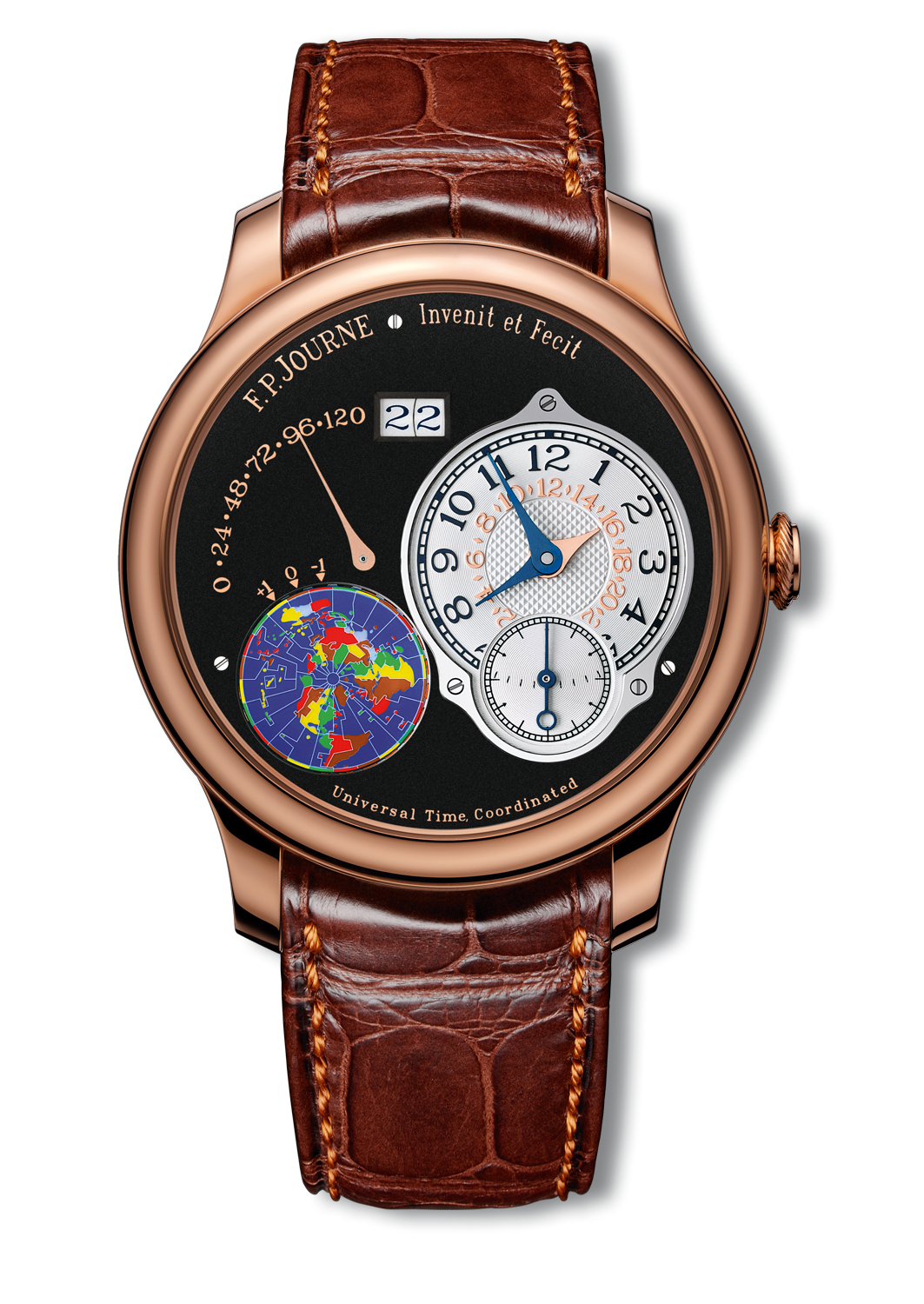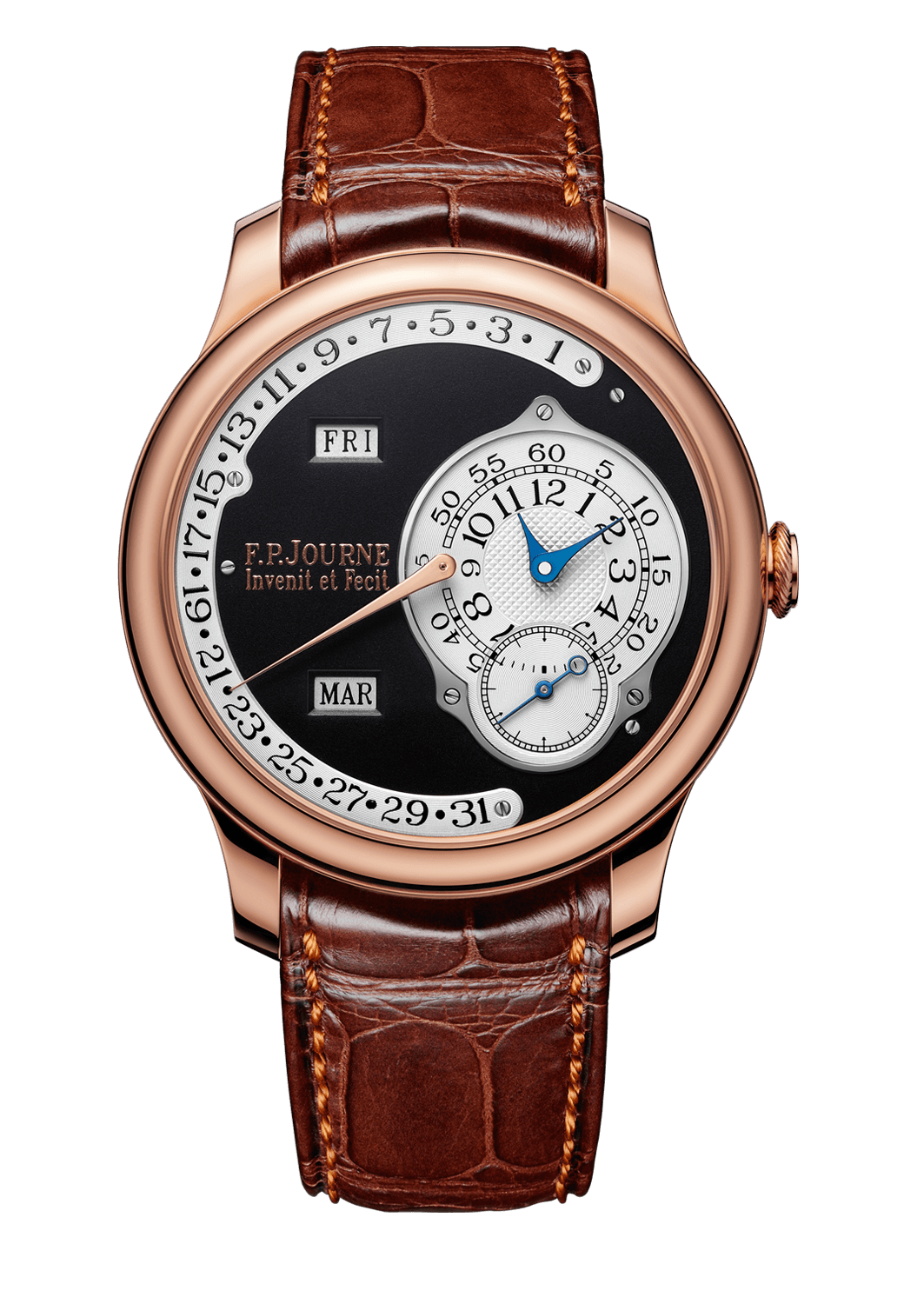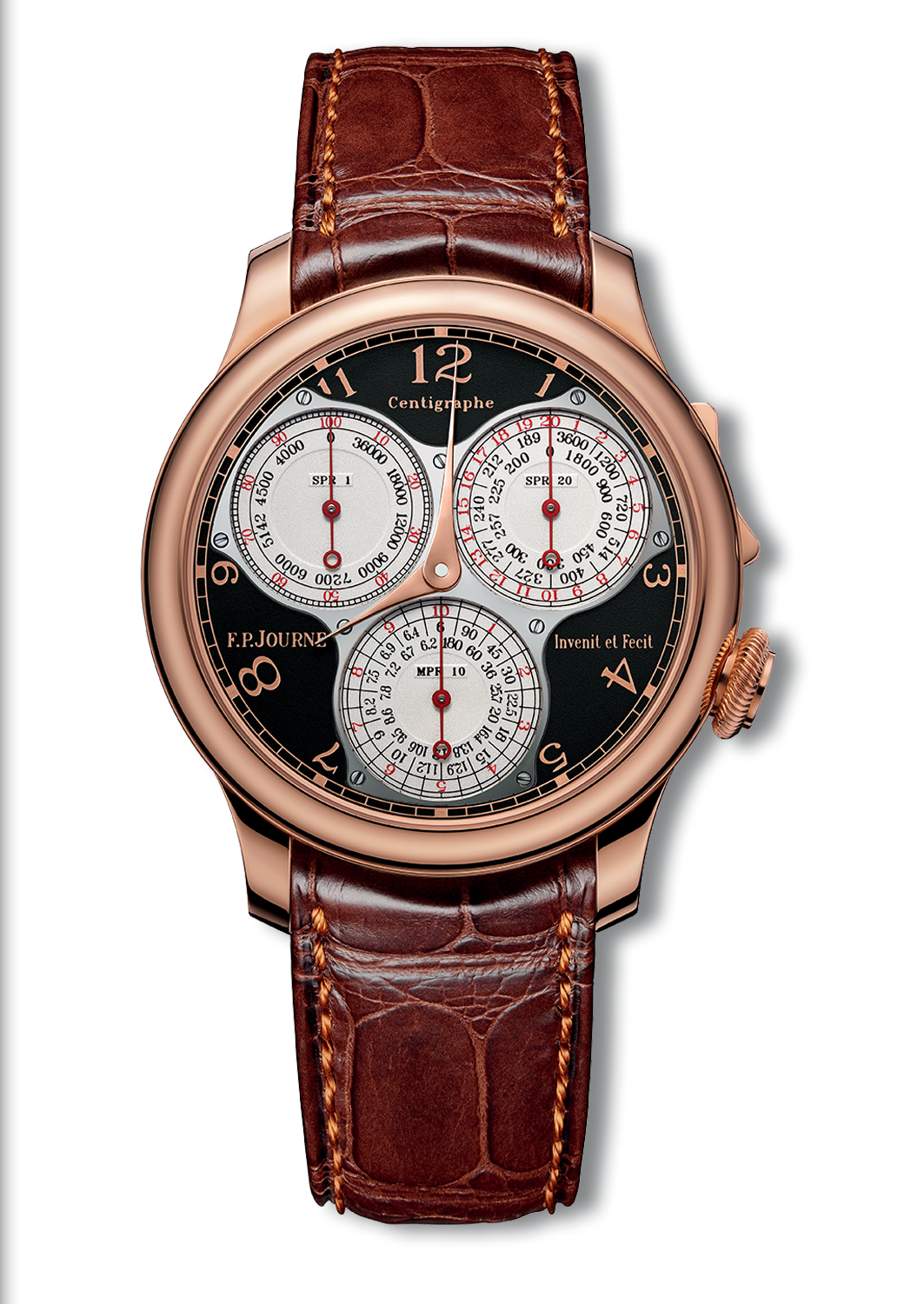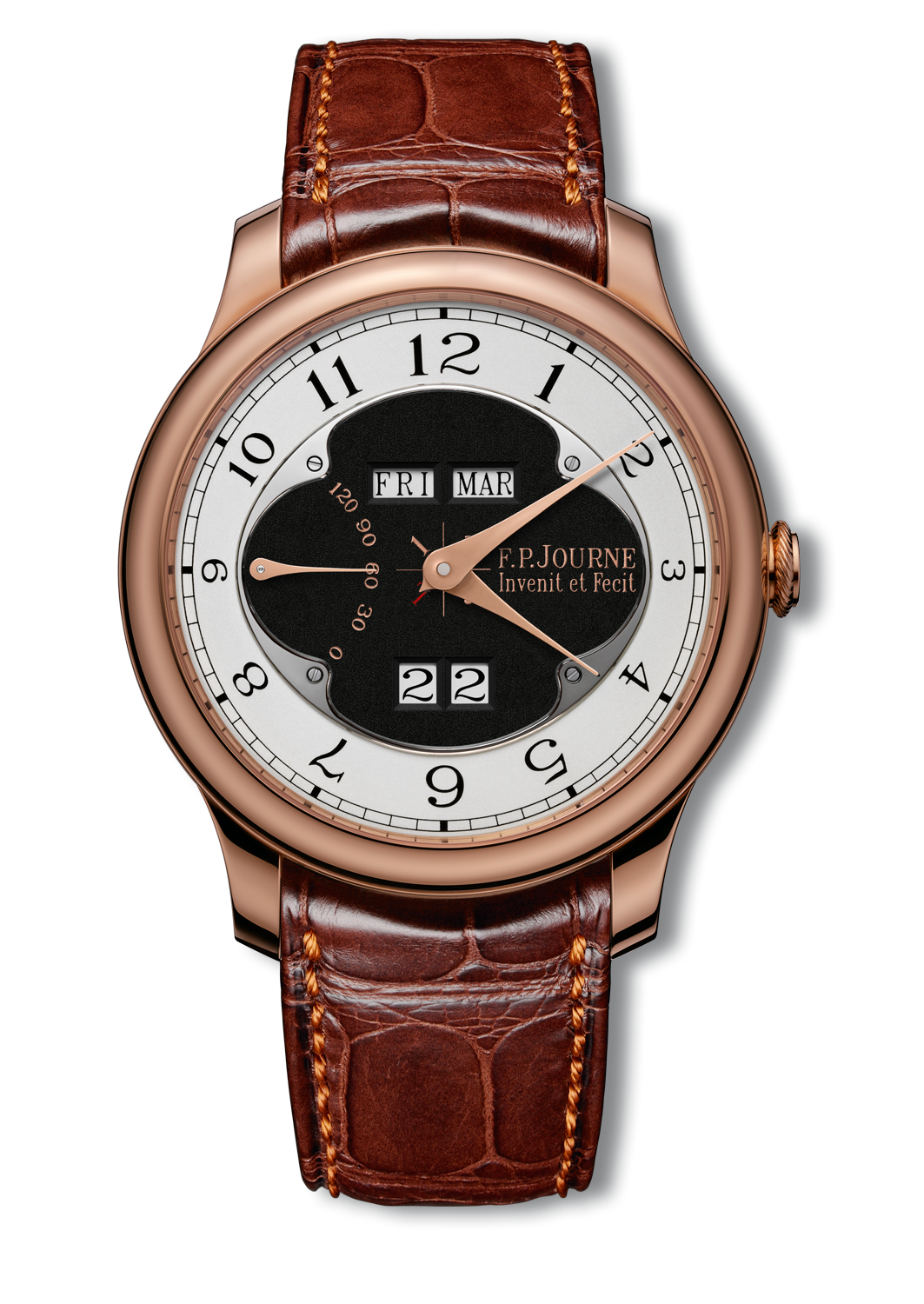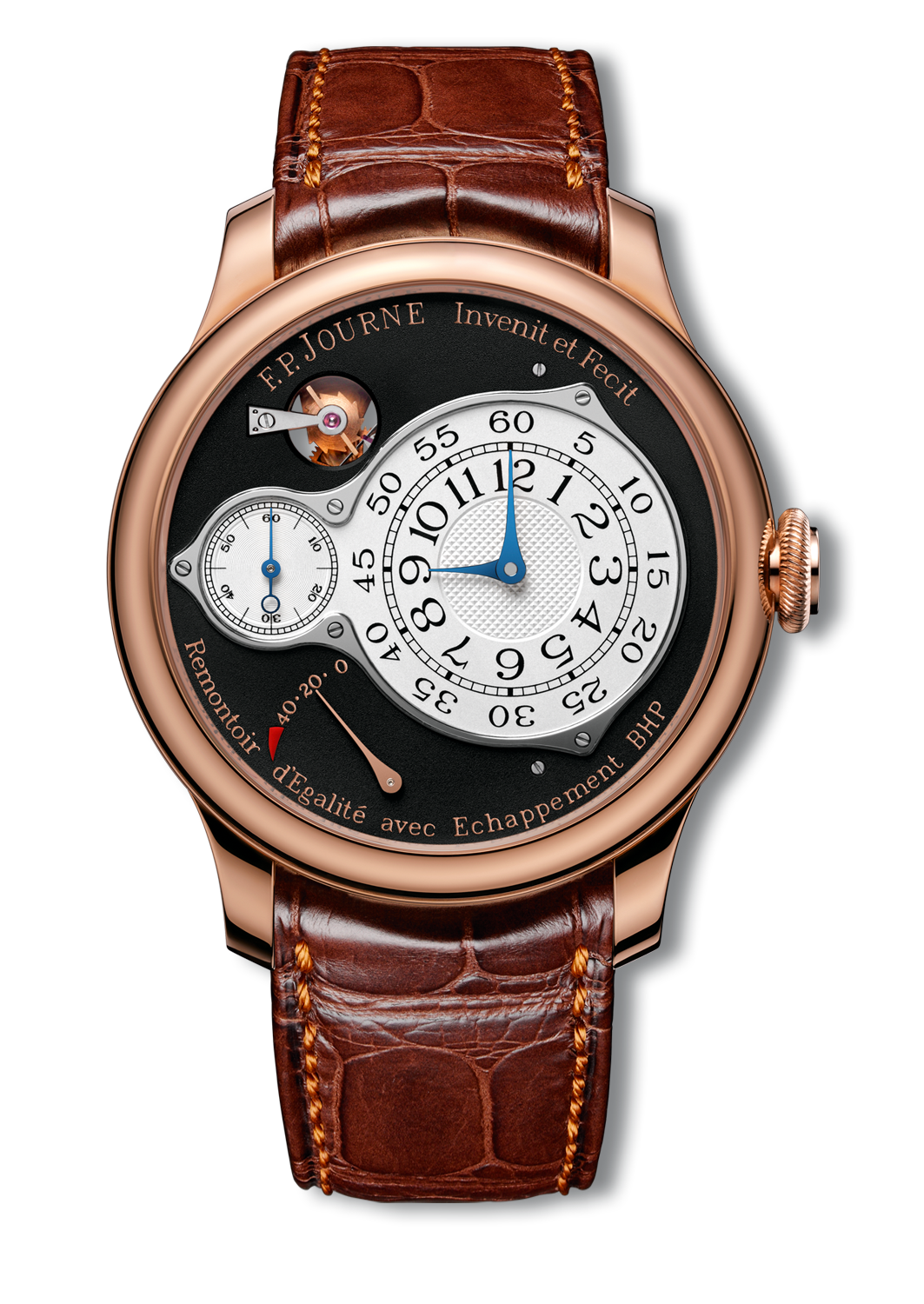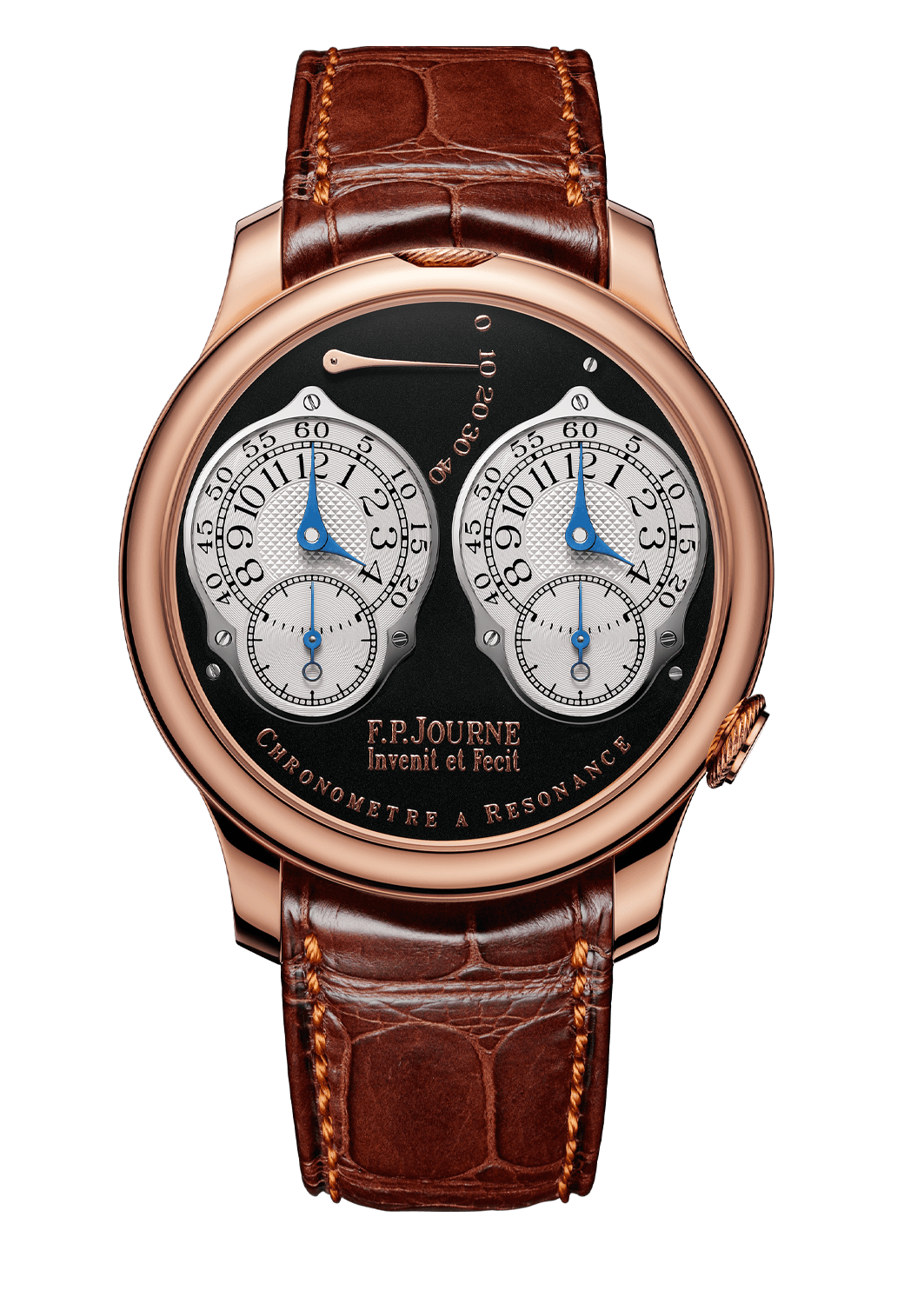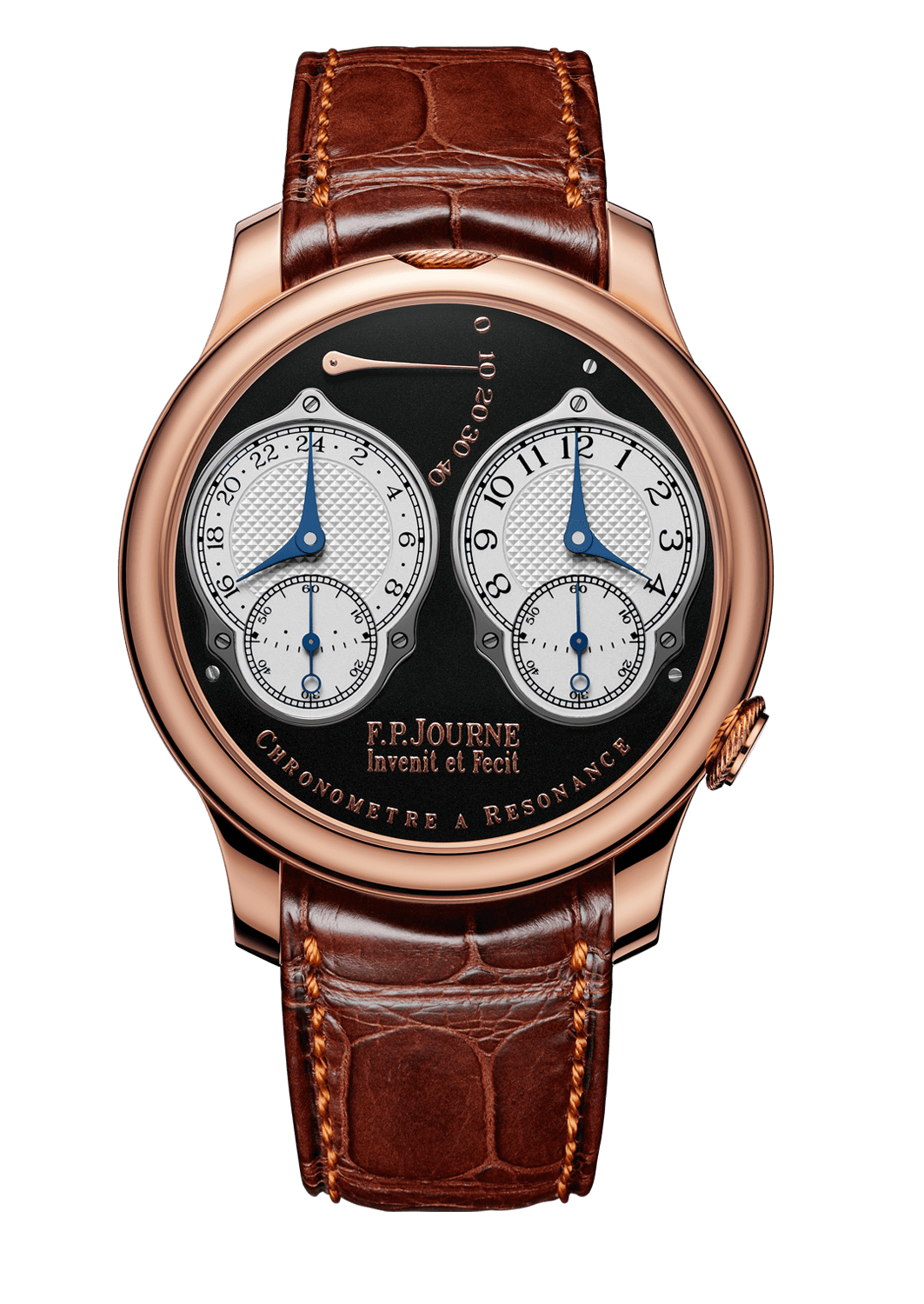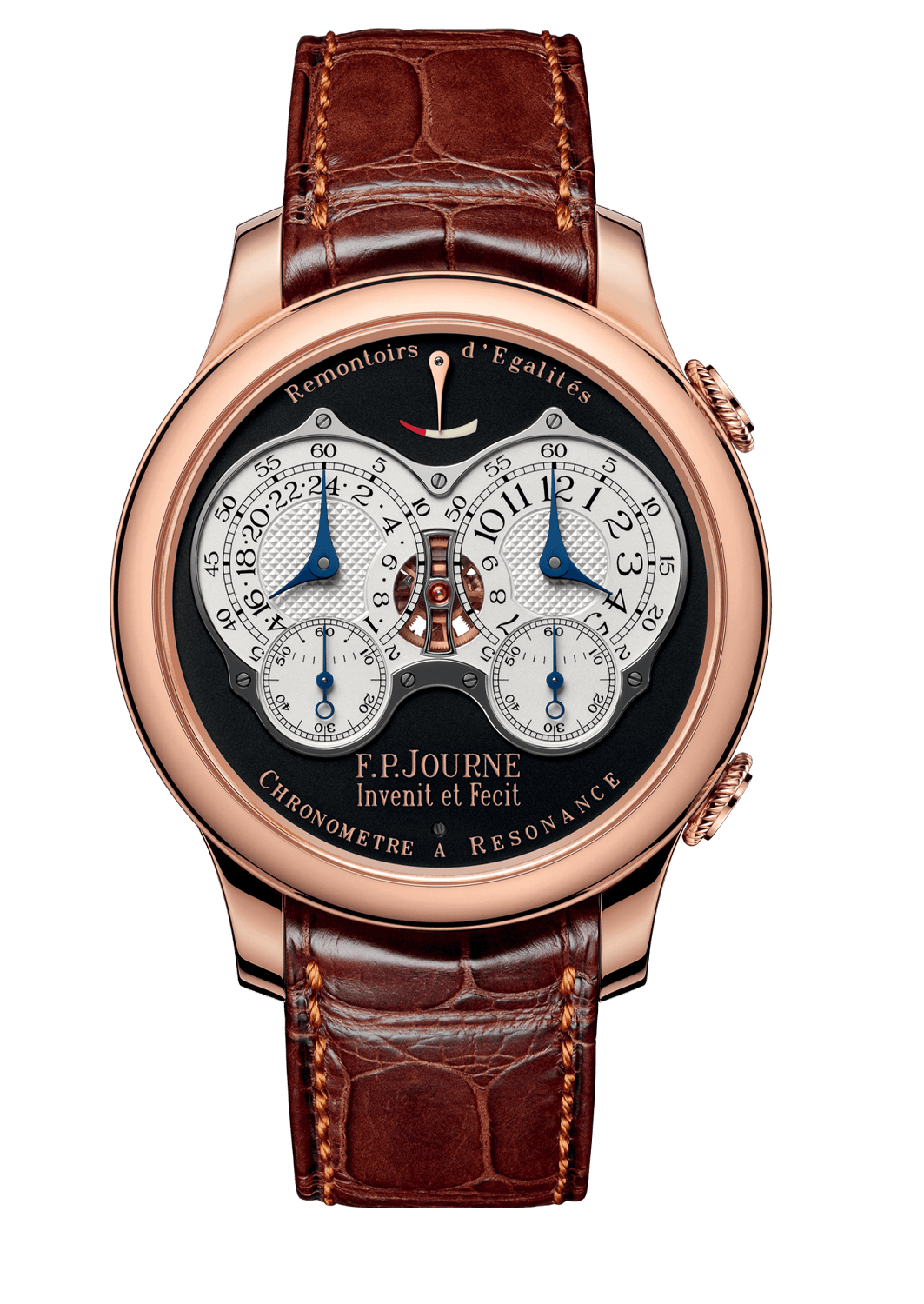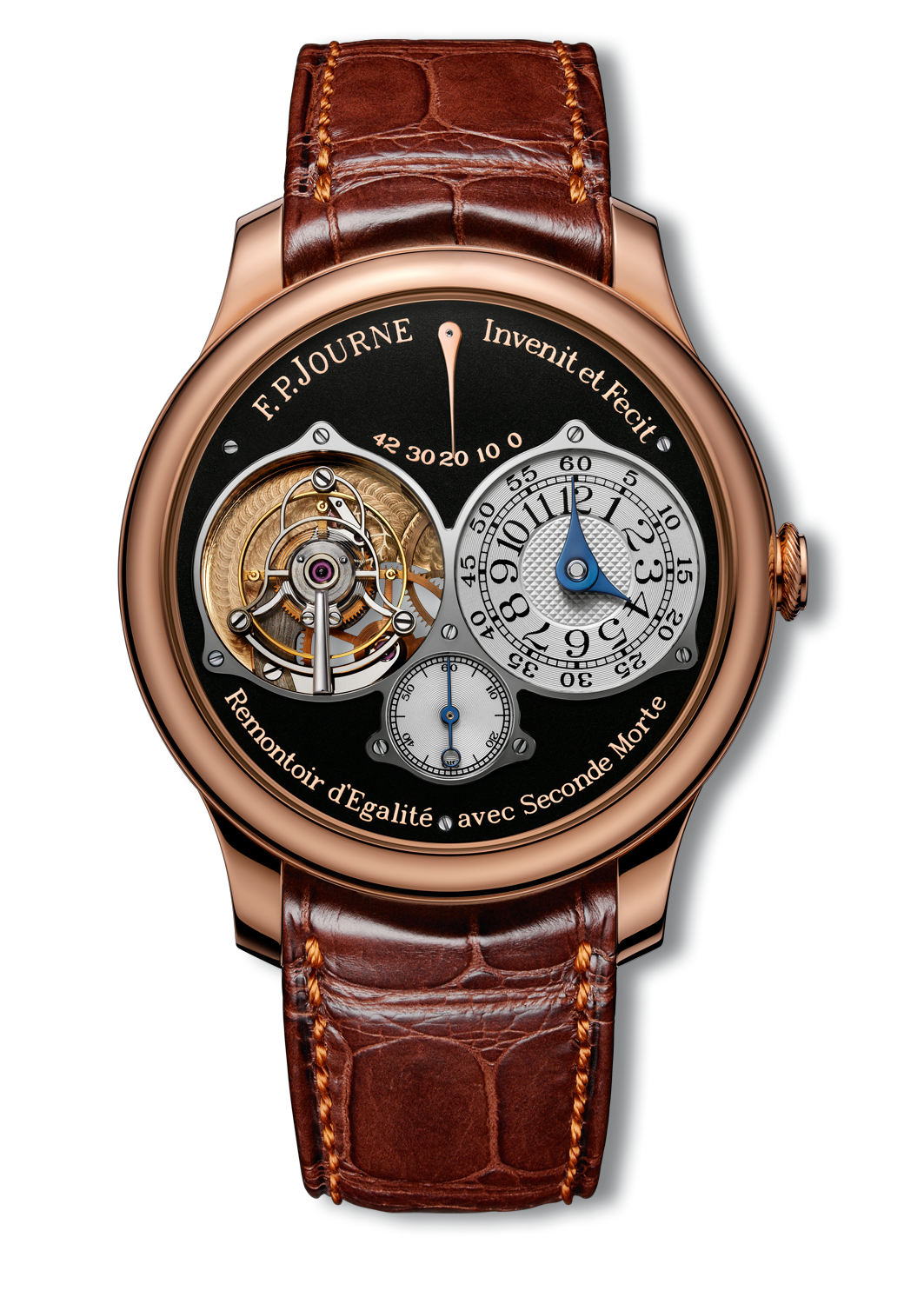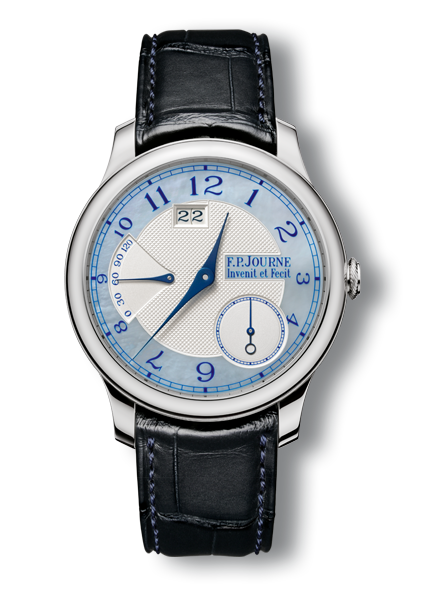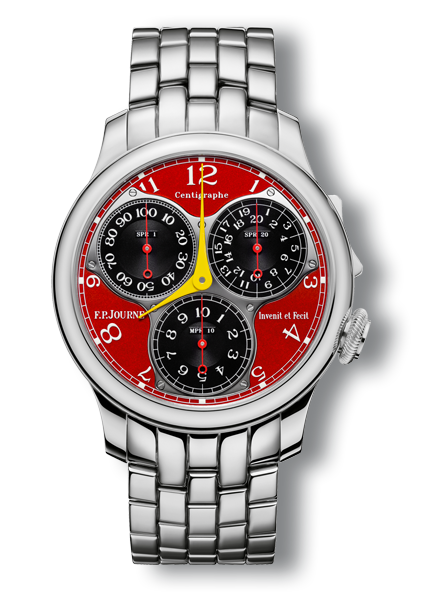Calibre 1510 https://www.fpjourne.com/en/collection/boutique-collection/boutique-edition-chronometre-optimum FP Journe https://www.fpjourne.com/en FP Journe

Diameter: 40 or 42 mm
Overall height: 9.5 mm
Dial: blackened Gold and whitened guilloché Silver
Hands: blued Steel and 5N gilt Steel
Technical Specifications
Calibre 1510
Manual winding / 27 turns of crown
18K rose Gold
- Overall diameter : 34.00 mm
- Casing-up diameter : 33.60 mm
- Height : 5.80 mm
- Height of winding system : 2.395 mm
- Diameter of stem thread : S1.20mm
Chronometric balance with inertia weight
Hair spring with Phillips curve
Mobile stud holder
Free sprung
Pinned GE stud
21,600 Alt/h (3Hz)
10.10 mg/cm2
58°
0h dial up: 260°
24h dial up: 260°
1 second remontoire at 11h, very light in Titanium and balanced
Natural dead beat second on the back of the movement
High performance Bi-axial escapement with arbor and wheels in Titanium, functioning without oil, (inspired by that of A.L. Breguet created in the XVIII Century)
2 mainspring barrels in parallel
2 position crown
Time adjustment in position 2
Off centre hours and minutes at 3h00
Small second at 9h00
Power reserve at 6h00
Large dead beat second on the back
70 ± 2 hours
Circular graining on baseplate
Geneva waves on bridges
Polished screw heads with chamfered slots
Pegs with polished rounded ends
Movement without dial : 240
Cased up with strap : 264
Jewels: 44
Calibre 1510
Manual winding / 27 turns of crown
18K rose Gold
- Overall diameter : 34.00 mm
- Casing-up diameter : 33.60 mm
- Height : 5.80 mm
- Height of winding system : 2.395 mm
- Diameter of stem thread : S1.20mm
Chronometric balance with inertia weight
Hair spring with Phillips curve
Mobile stud holder
Free sprung
Pinned GE stud
21,600 Alt/h (3Hz)
10.10 mg/cm2
58°
0h dial up: 260°
24h dial up: 260°
1 second remontoire at 11h, very light in Titanium and balanced
Natural dead beat second on the back of the movement
High performance Bi-axial escapement with arbor and wheels in Titanium, functioning without oil, (inspired by that of A.L. Breguet created in the XVIII Century)
2 mainspring barrels in parallel
2 position crown
Time adjustment in position 2
Off centre hours and minutes at 3h00
Small second at 9h00
Power reserve at 6h00
Large dead beat second on the back
70 ± 2 hours
Circular graining on baseplate
Geneva waves on bridges
Polished screw heads with chamfered slots
Pegs with polished rounded ends
Movement without dial : 240
Cased up with strap : 264
Jewels: 44
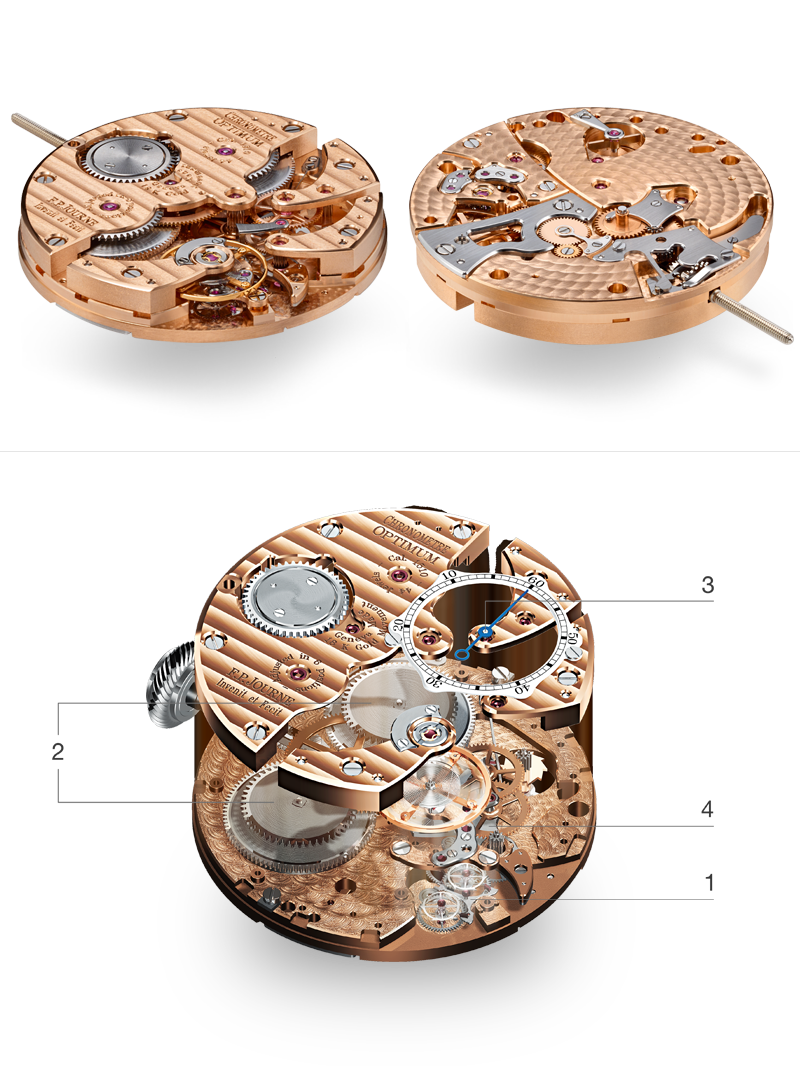
Technical description
(1) High Performance Bi-axial Escapement
(2) Double mainspring barrels in parallel
(3) Natural dead beat second in the back
(4) Constant force remontoire
---
The Chronomètre Optimum embodies the culmination of F.P. Journe chronometric research for a wristwatch.
- The double barrel with its two springs ensures the stability of the driving force of this emblematic movement made of 18K rose Gold, a specificity of the brand.
- The constant-force remontoire (patent EP1528443.A1) balances the driving force applied to the escapement to make it constant. By adding an extra gear representing an independent system wound in short spurts by the mainspring, the escapement ensures the balance's isochronism. This remontoire, made of titanium for the first time, maintains its balance in different positions, for greater efficiency.
- The EBHP High-Performance Bi-axial Escapement has also been patented (patent EP11405210.3). This two-wheel direct impulse escapement functions without oil and is the only direct impulse escapement to start up on its own. But not only does it function without lubricant, it also has far greater output than the majority of escapements: 50 hours without loss of amplitude. Many dual-wheel escapements have been created in the past, the most efficient being the "natural" escapement invented by A-L. Breguet (†1823).
- The balance with a spiral with Phillips curve guarantees better equilibrium.

Technical description
(1) High Performance Bi-axial Escapement
(2) Double mainspring barrels in parallel
(3) Natural dead beat second in the back
(4) Constant force remontoire
---
The Chronomètre Optimum embodies the culmination of F.P. Journe chronometric research for a wristwatch.
- The double barrel with its two springs ensures the stability of the driving force of this emblematic movement made of 18K rose Gold, a specificity of the brand.
- The constant-force remontoire (patent EP1528443.A1) balances the driving force applied to the escapement to make it constant. By adding an extra gear representing an independent system wound in short spurts by the mainspring, the escapement ensures the balance's isochronism. This remontoire, made of titanium for the first time, maintains its balance in different positions, for greater efficiency.
- The EBHP High-Performance Bi-axial Escapement has also been patented (patent EP11405210.3). This two-wheel direct impulse escapement functions without oil and is the only direct impulse escapement to start up on its own. But not only does it function without lubricant, it also has far greater output than the majority of escapements: 50 hours without loss of amplitude. Many dual-wheel escapements have been created in the past, the most efficient being the "natural" escapement invented by A-L. Breguet (†1823).
- The balance with a spiral with Phillips curve guarantees better equilibrium.
Diameter: 40 or 42 mm
Overall height: 9.5 mm
Dial: blackened Gold and whitened guilloché Silver
Hands: blued Steel and 5N gilt Steel

Diameter: 40 or 42 mm
Overall height: 9.5 mm
Dial: blackened Gold and whitened guilloché Silver
Hands: blued Steel and 5N gilt Steel
Technical Specifications
Calibre 1510
Manual winding / 27 turns of crown
18K rose Gold
- Overall diameter : 34.00 mm
- Casing-up diameter : 33.60 mm
- Height : 5.80 mm
- Height of winding system : 2.395 mm
- Diameter of stem thread : S1.20mm
Chronometric balance with inertia weight
Hair spring with Phillips curve
Mobile stud holder
Free sprung
Pinned GE stud
21,600 Alt/h (3Hz)
10.10 mg/cm2
58°
0h dial up: 260°
24h dial up: 260°
1 second remontoire at 11h, very light in Titanium and balanced
Natural dead beat second on the back of the movement
High performance Bi-axial escapement with arbor and wheels in Titanium, functioning without oil, (inspired by that of A.L. Breguet created in the XVIII Century)
2 mainspring barrels in parallel
2 position crown
Time adjustment in position 2
Off centre hours and minutes at 3h00
Small second at 9h00
Power reserve at 6h00
Large dead beat second on the back
70 ± 2 hours
Circular graining on baseplate
Geneva waves on bridges
Polished screw heads with chamfered slots
Pegs with polished rounded ends
Movement without dial : 240
Cased up with strap : 264
Jewels: 44
Calibre 1510
Manual winding / 27 turns of crown
18K rose Gold
- Overall diameter : 34.00 mm
- Casing-up diameter : 33.60 mm
- Height : 5.80 mm
- Height of winding system : 2.395 mm
- Diameter of stem thread : S1.20mm
Chronometric balance with inertia weight
Hair spring with Phillips curve
Mobile stud holder
Free sprung
Pinned GE stud
21,600 Alt/h (3Hz)
10.10 mg/cm2
58°
0h dial up: 260°
24h dial up: 260°
1 second remontoire at 11h, very light in Titanium and balanced
Natural dead beat second on the back of the movement
High performance Bi-axial escapement with arbor and wheels in Titanium, functioning without oil, (inspired by that of A.L. Breguet created in the XVIII Century)
2 mainspring barrels in parallel
2 position crown
Time adjustment in position 2
Off centre hours and minutes at 3h00
Small second at 9h00
Power reserve at 6h00
Large dead beat second on the back
70 ± 2 hours
Circular graining on baseplate
Geneva waves on bridges
Polished screw heads with chamfered slots
Pegs with polished rounded ends
Movement without dial : 240
Cased up with strap : 264
Jewels: 44

Technical description
(1) High Performance Bi-axial Escapement
(2) Double mainspring barrels in parallel
(3) Natural dead beat second in the back
(4) Constant force remontoire
---
The Chronomètre Optimum embodies the culmination of F.P. Journe chronometric research for a wristwatch.
- The double barrel with its two springs ensures the stability of the driving force of this emblematic movement made of 18K rose Gold, a specificity of the brand.
- The constant-force remontoire (patent EP1528443.A1) balances the driving force applied to the escapement to make it constant. By adding an extra gear representing an independent system wound in short spurts by the mainspring, the escapement ensures the balance's isochronism. This remontoire, made of titanium for the first time, maintains its balance in different positions, for greater efficiency.
- The EBHP High-Performance Bi-axial Escapement has also been patented (patent EP11405210.3). This two-wheel direct impulse escapement functions without oil and is the only direct impulse escapement to start up on its own. But not only does it function without lubricant, it also has far greater output than the majority of escapements: 50 hours without loss of amplitude. Many dual-wheel escapements have been created in the past, the most efficient being the "natural" escapement invented by A-L. Breguet (†1823).
- The balance with a spiral with Phillips curve guarantees better equilibrium.

Technical description
(1) High Performance Bi-axial Escapement
(2) Double mainspring barrels in parallel
(3) Natural dead beat second in the back
(4) Constant force remontoire
---
The Chronomètre Optimum embodies the culmination of F.P. Journe chronometric research for a wristwatch.
- The double barrel with its two springs ensures the stability of the driving force of this emblematic movement made of 18K rose Gold, a specificity of the brand.
- The constant-force remontoire (patent EP1528443.A1) balances the driving force applied to the escapement to make it constant. By adding an extra gear representing an independent system wound in short spurts by the mainspring, the escapement ensures the balance's isochronism. This remontoire, made of titanium for the first time, maintains its balance in different positions, for greater efficiency.
- The EBHP High-Performance Bi-axial Escapement has also been patented (patent EP11405210.3). This two-wheel direct impulse escapement functions without oil and is the only direct impulse escapement to start up on its own. But not only does it function without lubricant, it also has far greater output than the majority of escapements: 50 hours without loss of amplitude. Many dual-wheel escapements have been created in the past, the most efficient being the "natural" escapement invented by A-L. Breguet (†1823).
- The balance with a spiral with Phillips curve guarantees better equilibrium.
About
THE BOUTIQUE EDITION WITH BLACK DIAL ON 18K 6N GOLD CASE IS AVAILABLE ONLY IN THE F.P.JOURNE BOUTIQUES AND ESPACES AND FOR ALL F.P.JOURNE MODELS, APART FROM THE STRIKING WATCHES.
Combining modern technology with the rich heritage of the knowledge of time-telling history left to us by the great Masters, the Chronomètre Optimum joins the ranks of the iconic timepieces created by F.P.Journe Haute Horlogerie in its constant quest for precision, innovation and excellence.
Like all the models of the Classique collection, the Chronomètre Optimum has a manually wound mechanical movement manufactured in 18K rose Gold. It symbolises the very essence of precision in a wristwatch, testifying to the accomplishment of F.P.Journe’s chronometric research.
The Chronomètre Optimum contains a majority of exceptional components, here brought together for the first time in a watch: 2 barrels in parallel, the constant force remontoire, the revolutionary new High-Performance Bi-axial Escapement (EBHP), and natural dead-beat seconds. Due to these extraordinary technical achievements, this watch achieves the feat of telling time with near perfect accuracy.
The aesthetics of the hour, minutes and small seconds displays and the 70-hour power reserve harmonise perfectly with the wheel of the remontoire, visible on the dial. The sapphire case back reveals the 18K rose Gold movement, with its surprising natural dead-beat seconds framed by the seconds circle screwed to the movement’s bridges.
"I designed the Chronomètre Optimum in 2001. It was the first time that I integrated the dead beat second into my constant-force remontoire. This dead beat second can clearly be seen and is natural due to being linked to the one-second remontoire. In this watch the constant-force remontoire is visible while the second hand on the main dial ticks away at a speed of 3 hertz, i.e. 6 times per second (frequency of the escapement).
This watch, in 2004, inspired the Tourbillon Souverain with Dead Beat Second. As I was working on the Calibre Octa and the various models of these automatic watches at the same time, I was unable to put the Chronomètre Optimum into production. Then other models such as the Sonnerie Souveraine, the Centigraphe Souverain and the Répétition Souveraine took up all my time.
The basic premise was to make a watch with less internal friction, a constant force on the escapement to ensure isochronism and an escapement without lubrication to ensure stability.
1) Friction: to reduce friction the two barrels in parallel eliminate the lateral pressure to which the great wheel is subjected and exert a more stable force on the wheel train.
Isochronism: the balance's oscillation rate must always stay the same. Unfortunately the spiral is always imperfect, making it impossible to achieve this when amplitudes change due to the energy of the spring weakening. The constant-force remontoire (patent EP 1 528 443 A1) achieves constant amplitude for the first 45 hours of power reserve.
2) The escapement (EP11405210.3) patented under the name of EBHP is a direct impulse escapement, which means that the escapement wheels supply impulse directly to the axis of the balance. In the 18th century there were several direct impulse escapements: the spring detent or pivoted detent escapement, the Robin escapement, Breguet's natural escapement, etc. All these escapements work without oil but are not suitable for wristwatches.
Modern escapements are assumed to be self-starting and to have the stabilising features required to deal with arm movement. For this reason the EBHP has an original geometry enabling automatic starting and a configuration of ruby pallets blocking the escapement wheels at a specific angle, similar to the Swiss anchor escapement, enabling "recoil". This isolates the blocking anchor from the balance in order to stabilise it during movement on the wrist.
My watchmaking philosophy is to make watches that will still work in 200 years. Those made 200 years ago are still in working order today if they have been maintained regularly. It is for this reason that I only use solid materials that have proven their worth rather than modern materials that will probably be unable to be repaired in a few decades.
Variations in some of the watches from the Classique collection:
- The Chronomètre à Résonance achieves a constant rate when exposed to movement on the wrist. This watch is very accurate because its rate is not affected when the watch is worn.
- The Tourbillon Souverain: the classic tourbillon is not generally a very good watch, but combined with a constant force remontoire, its stability is guaranteed.
- The Chronomètre Souverain: has the same accuracy as the Chronomètre à Résonance but does not cancel out the effects of being worn."
François-Paul Journe
Technical Specifications
Calibre 1510
Manual winding / 27 turns of crown
18K rose Gold
- Overall diameter : 34.00 mm
- Casing-up diameter : 33.60 mm
- Height : 5.80 mm
- Height of winding system : 2.395 mm
- Diameter of stem thread : S1.20mm
Chronometric balance with inertia weight
Hair spring with Phillips curve
Mobile stud holder
Free sprung
Pinned GE stud
21,600 Alt/h (3Hz)
10.10 mg/cm2
58°
0h dial up: 260°
24h dial up: 260°
1 second remontoire at 11h, very light in Titanium and balanced
Natural dead beat second on the back of the movement
High performance Bi-axial escapement with arbor and wheels in Titanium, functioning without oil, (inspired by that of A.L. Breguet created in the XVIII Century)
2 mainspring barrels in parallel
2 position crown
Time adjustment in position 2
Off centre hours and minutes at 3h00
Small second at 9h00
Power reserve at 6h00
Large dead beat second on the back
70 ± 2 hours
Circular graining on baseplate
Geneva waves on bridges
Polished screw heads with chamfered slots
Pegs with polished rounded ends
Movement without dial : 240
Cased up with strap : 264
Jewels: 44
Calibre 1510
Manual winding / 27 turns of crown
18K rose Gold
- Overall diameter : 34.00 mm
- Casing-up diameter : 33.60 mm
- Height : 5.80 mm
- Height of winding system : 2.395 mm
- Diameter of stem thread : S1.20mm
Chronometric balance with inertia weight
Hair spring with Phillips curve
Mobile stud holder
Free sprung
Pinned GE stud
21,600 Alt/h (3Hz)
10.10 mg/cm2
58°
0h dial up: 260°
24h dial up: 260°
1 second remontoire at 11h, very light in Titanium and balanced
Natural dead beat second on the back of the movement
High performance Bi-axial escapement with arbor and wheels in Titanium, functioning without oil, (inspired by that of A.L. Breguet created in the XVIII Century)
2 mainspring barrels in parallel
2 position crown
Time adjustment in position 2
Off centre hours and minutes at 3h00
Small second at 9h00
Power reserve at 6h00
Large dead beat second on the back
70 ± 2 hours
Circular graining on baseplate
Geneva waves on bridges
Polished screw heads with chamfered slots
Pegs with polished rounded ends
Movement without dial : 240
Cased up with strap : 264
Jewels: 44

Technical description
(1) High Performance Bi-axial Escapement
(2) Double mainspring barrels in parallel
(3) Natural dead beat second in the back
(4) Constant force remontoire
---
The Chronomètre Optimum embodies the culmination of F.P. Journe chronometric research for a wristwatch.
- The double barrel with its two springs ensures the stability of the driving force of this emblematic movement made of 18K rose Gold, a specificity of the brand.
- The constant-force remontoire (patent EP1528443.A1) balances the driving force applied to the escapement to make it constant. By adding an extra gear representing an independent system wound in short spurts by the mainspring, the escapement ensures the balance's isochronism. This remontoire, made of titanium for the first time, maintains its balance in different positions, for greater efficiency.
- The EBHP High-Performance Bi-axial Escapement has also been patented (patent EP11405210.3). This two-wheel direct impulse escapement functions without oil and is the only direct impulse escapement to start up on its own. But not only does it function without lubricant, it also has far greater output than the majority of escapements: 50 hours without loss of amplitude. Many dual-wheel escapements have been created in the past, the most efficient being the "natural" escapement invented by A-L. Breguet (†1823).
- The balance with a spiral with Phillips curve guarantees better equilibrium.

Technical description
(1) High Performance Bi-axial Escapement
(2) Double mainspring barrels in parallel
(3) Natural dead beat second in the back
(4) Constant force remontoire
---
The Chronomètre Optimum embodies the culmination of F.P. Journe chronometric research for a wristwatch.
- The double barrel with its two springs ensures the stability of the driving force of this emblematic movement made of 18K rose Gold, a specificity of the brand.
- The constant-force remontoire (patent EP1528443.A1) balances the driving force applied to the escapement to make it constant. By adding an extra gear representing an independent system wound in short spurts by the mainspring, the escapement ensures the balance's isochronism. This remontoire, made of titanium for the first time, maintains its balance in different positions, for greater efficiency.
- The EBHP High-Performance Bi-axial Escapement has also been patented (patent EP11405210.3). This two-wheel direct impulse escapement functions without oil and is the only direct impulse escapement to start up on its own. But not only does it function without lubricant, it also has far greater output than the majority of escapements: 50 hours without loss of amplitude. Many dual-wheel escapements have been created in the past, the most efficient being the "natural" escapement invented by A-L. Breguet (†1823).
- The balance with a spiral with Phillips curve guarantees better equilibrium.
-
About
THIS MODEL WAS PRODUCED BETWEEN 2014 AND 2024.
THE BOUTIQUE EDITION WITH BLACK DIAL ON 18K 6N GOLD CASE IS AVAILABLE ONLY IN THE F.P.JOURNE BOUTIQUES AND ESPACES AND FOR ALL F.P.JOURNE MODELS, APART FROM THE STRIKING WATCHES.
Combining modern technology with the rich heritage of the knowledge of time-telling history left to us by the great Masters, the Chronomètre Optimum joins the ranks of the iconic timepieces created by F.P.Journe Haute Horlogerie in its constant quest for precision, innovation and excellence.
Like all the models of the Classique collection, the Chronomètre Optimum has a manually wound mechanical movement manufactured in 18K rose Gold. It symbolises the very essence of precision in a wristwatch, testifying to the accomplishment of F.P.Journe’s chronometric research.
The Chronomètre Optimum contains a majority of exceptional components, here brought together for the first time in a watch: 2 barrels in parallel, the constant force remontoire, the revolutionary new High-Performance Bi-axial Escapement (EBHP), and natural dead-beat seconds. Due to these extraordinary technical achievements, this watch achieves the feat of telling time with near perfect accuracy.
The aesthetics of the hour, minutes and small seconds displays and the 70-hour power reserve harmonise perfectly with the wheel of the remontoire, visible on the dial. The sapphire case back reveals the 18K rose Gold movement, with its surprising natural dead-beat seconds framed by the seconds circle screwed to the movement’s bridges. -
Testimony
EBHP - F.P.Journe High-Performance Bi-axial Escapement
"I designed the Chronomètre Optimum in 2001. It was the first time that I integrated the dead beat second into my constant-force remontoire. This dead beat second can clearly be seen and is natural due to being linked to the one-second remontoire. In this watch the constant-force remontoire is visible while the second hand on the main dial ticks away at a speed of 3 hertz, i.e. 6 times per second (frequency of the escapement).
This watch, in 2004, inspired the Tourbillon Souverain with Dead Beat Second. As I was working on the Calibre Octa and the various models of these automatic watches at the same time, I was unable to put the Chronomètre Optimum into production. Then other models such as the Sonnerie Souveraine, the Centigraphe Souverain and the Répétition Souveraine took up all my time.
The basic premise was to make a watch with less internal friction, a constant force on the escapement to ensure isochronism and an escapement without lubrication to ensure stability.
1) Friction: to reduce friction the two barrels in parallel eliminate the lateral pressure to which the great wheel is subjected and exert a more stable force on the wheel train.
Isochronism: the balance's oscillation rate must always stay the same. Unfortunately the spiral is always imperfect, making it impossible to achieve this when amplitudes change due to the energy of the spring weakening. The constant-force remontoire (patent EP 1 528 443 A1) achieves constant amplitude for the first 45 hours of power reserve.
2) The escapement (EP11405210.3) patented under the name of EBHP is a direct impulse escapement, which means that the escapement wheels supply impulse directly to the axis of the balance. In the 18th century there were several direct impulse escapements: the spring detent or pivoted detent escapement, the Robin escapement, Breguet's natural escapement, etc. All these escapements work without oil but are not suitable for wristwatches.
Modern escapements are assumed to be self-starting and to have the stabilising features required to deal with arm movement. For this reason the EBHP has an original geometry enabling automatic starting and a configuration of ruby pallets blocking the escapement wheels at a specific angle, similar to the Swiss anchor escapement, enabling "recoil". This isolates the blocking anchor from the balance in order to stabilise it during movement on the wrist.
My watchmaking philosophy is to make watches that will still work in 200 years. Those made 200 years ago are still in working order today if they have been maintained regularly. It is for this reason that I only use solid materials that have proven their worth rather than modern materials that will probably be unable to be repaired in a few decades.
Variations in some of the watches from the Classique collection:
- The Chronomètre à Résonance achieves a constant rate when exposed to movement on the wrist. This watch is very accurate because its rate is not affected when the watch is worn.
- The Tourbillon Souverain: the classic tourbillon is not generally a very good watch, but combined with a constant force remontoire, its stability is guaranteed.
- The Chronomètre Souverain: has the same accuracy as the Chronomètre à Résonance but does not cancel out the effects of being worn."
François-Paul Journe -
Technical description
Technical Specifications
Mouvement :Calibre 1510
Manual winding / 27 turns of crown
18K rose GoldDimensions :- Overall diameter : 34.00 mm
- Casing-up diameter : 33.60 mm
- Height : 5.80 mm
- Height of winding system : 2.395 mm
- Diameter of stem thread : S1.20mm
Balance :Chronometric balance with inertia weight
Hair spring with Phillips curve
Mobile stud holder
Free sprung
Pinned GE studFrequency :21,600 Alt/h (3Hz)
Inertia :10.10 mg/cm2
Angle of lift :58°
Amplitude :0h dial up: 260°
24h dial up: 260°Characteristics :1 second remontoire at 11h, very light in Titanium and balanced
Natural dead beat second on the back of the movement
High performance Bi-axial escapement with arbor and wheels in Titanium, functioning without oil, (inspired by that of A.L. Breguet created in the XVIII Century)
2 mainspring barrels in parallel
2 position crown
Time adjustment in position 2Indications :Off centre hours and minutes at 3h00
Small second at 9h00
Power reserve at 6h00
Large dead beat second on the backAutonomy :70 ± 2 hours
Finishes :Circular graining on baseplate
Geneva waves on bridges
Polished screw heads with chamfered slots
Pegs with polished rounded endsNumber of parts :Movement without dial : 240
Cased up with strap : 264
Jewels: 44Mouvement :Calibre 1510
Manual winding / 27 turns of crown
18K rose GoldDimensions :- Overall diameter : 34.00 mm
- Casing-up diameter : 33.60 mm
- Height : 5.80 mm
- Height of winding system : 2.395 mm
- Diameter of stem thread : S1.20mm
Balance :Chronometric balance with inertia weight
Hair spring with Phillips curve
Mobile stud holder
Free sprung
Pinned GE studFrequency :21,600 Alt/h (3Hz)
Inertia :10.10 mg/cm2
Angle of lift :58°
Amplitude :0h dial up: 260°
24h dial up: 260°Characteristics :1 second remontoire at 11h, very light in Titanium and balanced
Natural dead beat second on the back of the movement
High performance Bi-axial escapement with arbor and wheels in Titanium, functioning without oil, (inspired by that of A.L. Breguet created in the XVIII Century)
2 mainspring barrels in parallel
2 position crown
Time adjustment in position 2Indications :Off centre hours and minutes at 3h00
Small second at 9h00
Power reserve at 6h00
Large dead beat second on the backAutonomy :70 ± 2 hours
Finishes :Circular graining on baseplate
Geneva waves on bridges
Polished screw heads with chamfered slots
Pegs with polished rounded endsNumber of parts :Movement without dial : 240
Cased up with strap : 264
Jewels: 44
At the heart of the movementAt the heart of the movementBrevet - EP 11405210.3 / EP 1 528 443 A1 / EP 1 760 544 A1Technical description
(1) High Performance Bi-axial Escapement
(2) Double mainspring barrels in parallel
(3) Natural dead beat second in the back
(4) Constant force remontoire
---
The Chronomètre Optimum embodies the culmination of F.P. Journe chronometric research for a wristwatch.
- The double barrel with its two springs ensures the stability of the driving force of this emblematic movement made of 18K rose Gold, a specificity of the brand.
- The constant-force remontoire (patent EP1528443.A1) balances the driving force applied to the escapement to make it constant. By adding an extra gear representing an independent system wound in short spurts by the mainspring, the escapement ensures the balance's isochronism. This remontoire, made of titanium for the first time, maintains its balance in different positions, for greater efficiency.
- The EBHP High-Performance Bi-axial Escapement has also been patented (patent EP11405210.3). This two-wheel direct impulse escapement functions without oil and is the only direct impulse escapement to start up on its own. But not only does it function without lubricant, it also has far greater output than the majority of escapements: 50 hours without loss of amplitude. Many dual-wheel escapements have been created in the past, the most efficient being the "natural" escapement invented by A-L. Breguet (†1823).
- The balance with a spiral with Phillips curve guarantees better equilibrium.
Brevet - EP 11405210.3 / EP 1 528 443 A1 / EP 1 760 544 A1
Technical description
(1) High Performance Bi-axial Escapement
(2) Double mainspring barrels in parallel
(3) Natural dead beat second in the back
(4) Constant force remontoire
---
The Chronomètre Optimum embodies the culmination of F.P. Journe chronometric research for a wristwatch.
- The double barrel with its two springs ensures the stability of the driving force of this emblematic movement made of 18K rose Gold, a specificity of the brand.
- The constant-force remontoire (patent EP1528443.A1) balances the driving force applied to the escapement to make it constant. By adding an extra gear representing an independent system wound in short spurts by the mainspring, the escapement ensures the balance's isochronism. This remontoire, made of titanium for the first time, maintains its balance in different positions, for greater efficiency.
- The EBHP High-Performance Bi-axial Escapement has also been patented (patent EP11405210.3). This two-wheel direct impulse escapement functions without oil and is the only direct impulse escapement to start up on its own. But not only does it function without lubricant, it also has far greater output than the majority of escapements: 50 hours without loss of amplitude. Many dual-wheel escapements have been created in the past, the most efficient being the "natural" escapement invented by A-L. Breguet (†1823).
- The balance with a spiral with Phillips curve guarantees better equilibrium.
Technical Specifications
Calibre 1510
Manual winding / 27 turns of crown
18K rose Gold
- Overall diameter : 34.00 mm
- Casing-up diameter : 33.60 mm
- Height : 5.80 mm
- Height of winding system : 2.395 mm
- Diameter of stem thread : S1.20mm
Chronometric balance with inertia weight
Hair spring with Phillips curve
Mobile stud holder
Free sprung
Pinned GE stud
21,600 Alt/h (3Hz)
10.10 mg/cm2
58°
0h dial up: 260°
24h dial up: 260°
1 second remontoire at 11h, very light in Titanium and balanced
Natural dead beat second on the back of the movement
High performance Bi-axial escapement with arbor and wheels in Titanium, functioning without oil, (inspired by that of A.L. Breguet created in the XVIII Century)
2 mainspring barrels in parallel
2 position crown
Time adjustment in position 2
Off centre hours and minutes at 3h00
Small second at 9h00
Power reserve at 6h00
Large dead beat second on the back
70 ± 2 hours
Circular graining on baseplate
Geneva waves on bridges
Polished screw heads with chamfered slots
Pegs with polished rounded ends
Movement without dial : 240
Cased up with strap : 264
Jewels: 44
Calibre 1510
Manual winding / 27 turns of crown
18K rose Gold
- Overall diameter : 34.00 mm
- Casing-up diameter : 33.60 mm
- Height : 5.80 mm
- Height of winding system : 2.395 mm
- Diameter of stem thread : S1.20mm
Chronometric balance with inertia weight
Hair spring with Phillips curve
Mobile stud holder
Free sprung
Pinned GE stud
21,600 Alt/h (3Hz)
10.10 mg/cm2
58°
0h dial up: 260°
24h dial up: 260°
1 second remontoire at 11h, very light in Titanium and balanced
Natural dead beat second on the back of the movement
High performance Bi-axial escapement with arbor and wheels in Titanium, functioning without oil, (inspired by that of A.L. Breguet created in the XVIII Century)
2 mainspring barrels in parallel
2 position crown
Time adjustment in position 2
Off centre hours and minutes at 3h00
Small second at 9h00
Power reserve at 6h00
Large dead beat second on the back
70 ± 2 hours
Circular graining on baseplate
Geneva waves on bridges
Polished screw heads with chamfered slots
Pegs with polished rounded ends
Movement without dial : 240
Cased up with strap : 264
Jewels: 44

Technical description
(1) High Performance Bi-axial Escapement
(2) Double mainspring barrels in parallel
(3) Natural dead beat second in the back
(4) Constant force remontoire
---
The Chronomètre Optimum embodies the culmination of F.P. Journe chronometric research for a wristwatch.
- The double barrel with its two springs ensures the stability of the driving force of this emblematic movement made of 18K rose Gold, a specificity of the brand.
- The constant-force remontoire (patent EP1528443.A1) balances the driving force applied to the escapement to make it constant. By adding an extra gear representing an independent system wound in short spurts by the mainspring, the escapement ensures the balance's isochronism. This remontoire, made of titanium for the first time, maintains its balance in different positions, for greater efficiency.
- The EBHP High-Performance Bi-axial Escapement has also been patented (patent EP11405210.3). This two-wheel direct impulse escapement functions without oil and is the only direct impulse escapement to start up on its own. But not only does it function without lubricant, it also has far greater output than the majority of escapements: 50 hours without loss of amplitude. Many dual-wheel escapements have been created in the past, the most efficient being the "natural" escapement invented by A-L. Breguet (†1823).
- The balance with a spiral with Phillips curve guarantees better equilibrium.

Technical description
(1) High Performance Bi-axial Escapement
(2) Double mainspring barrels in parallel
(3) Natural dead beat second in the back
(4) Constant force remontoire
---
The Chronomètre Optimum embodies the culmination of F.P. Journe chronometric research for a wristwatch.
- The double barrel with its two springs ensures the stability of the driving force of this emblematic movement made of 18K rose Gold, a specificity of the brand.
- The constant-force remontoire (patent EP1528443.A1) balances the driving force applied to the escapement to make it constant. By adding an extra gear representing an independent system wound in short spurts by the mainspring, the escapement ensures the balance's isochronism. This remontoire, made of titanium for the first time, maintains its balance in different positions, for greater efficiency.
- The EBHP High-Performance Bi-axial Escapement has also been patented (patent EP11405210.3). This two-wheel direct impulse escapement functions without oil and is the only direct impulse escapement to start up on its own. But not only does it function without lubricant, it also has far greater output than the majority of escapements: 50 hours without loss of amplitude. Many dual-wheel escapements have been created in the past, the most efficient being the "natural" escapement invented by A-L. Breguet (†1823).
- The balance with a spiral with Phillips curve guarantees better equilibrium.

